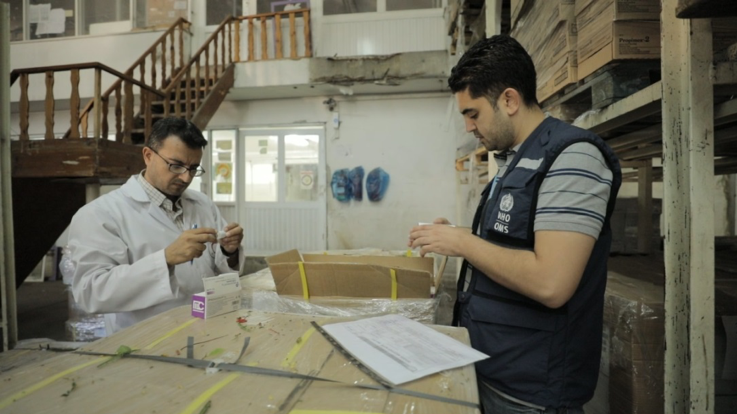 The World Health Organization delivered anti-epileptic drugs to the Central Drugs Store of the Palestinian Ministry of Health in Gaza7 Sep 2018, Gaza – The World Health Organization delivered anti-epileptic drugs to the Central Drugs Store of the Palestinian Ministry of Health in Gaza on Wednesday 6 September. The procurement of anti-epileptic drugs and other essential psychotropic medicines (medicines used in the treatment of mental health) for the occupied Palestinian territory is a main component of the EU-funded WHO project Building Palestinian resilience: improving psychosocial and mental health responses to emergency situations.
The World Health Organization delivered anti-epileptic drugs to the Central Drugs Store of the Palestinian Ministry of Health in Gaza7 Sep 2018, Gaza – The World Health Organization delivered anti-epileptic drugs to the Central Drugs Store of the Palestinian Ministry of Health in Gaza on Wednesday 6 September. The procurement of anti-epileptic drugs and other essential psychotropic medicines (medicines used in the treatment of mental health) for the occupied Palestinian territory is a main component of the EU-funded WHO project Building Palestinian resilience: improving psychosocial and mental health responses to emergency situations.
Anti-epileptic drugs are the main type of treatment for most people with epilepsy, aimed at preventing seizures from happening. They are also used in the treatment of neuropathic pain, migraine and bipolar disorder. Epilepsy is a chronic disorder of the brain that affects people worldwide and is characterized by recurrent seizures. There are approximately 12,000 people in Gaza with epilepsy.
There continues to be a long-term shortage and depletion of medicines and medical disposables in Gaza, affecting access to effective health care for patients. In August, 50% of essential medicines, including anti-epileptic drugs, were critically depleted with less than a month’s stock remaining, according to Gaza’s Central Drugs Store. The Palestinian National Mental Health Strategy (2015-2019) recognizes that long-term shortages of psychotropic medicines represent a major challenge to the health sector, hindering the continuity of mental health services for patients in the occupied Palestinian territory. The procurement and delivery of essential medicines to treat mental illness forms a core component of the WHO Mental Health Project, which has utilized 800,000 Euros to deliver psychotropic medicines to the West Bank and Gaza in 2017-2018.
The WHO Mental Health Project aims to improve mental health services, including access to mental health services during emergencies. In addition to the procurement and delivery of essential medicines, the Palestinian Ministry of Health with WHO has developed a national emergency mental health plan and intervention guidelines, and delivered training to health professionals on the Mental Health Gap Action Programme, as well as training on the provision of psychological first aid to emergency medical teams.




